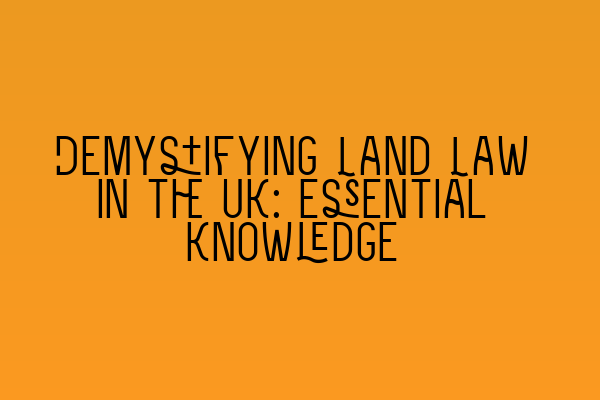Demystifying Land Law in the UK: Essential Knowledge
Land law is a complex field that governs the ownership, use, and transfer of land in the UK. Whether you are a property owner, buyer, seller, or legal professional, having a solid understanding of land law is essential to navigate through various property-related transactions and disputes.
Understanding the Basics of Land Law
Land law encompasses a wide range of legal principles and rules that determine the rights and obligations associated with land ownership. It covers aspects such as:
- Freehold and leasehold properties
- Easements and restrictive covenants
- Boundaries and encroachments
- Mortgages and charges
- Adverse possession and land registration
Each of these areas requires careful consideration and understanding to ensure that your rights are protected and your transactions are legally valid.
Freehold and Leasehold Properties
In the UK, properties can be owned either on a freehold or leasehold basis. Freehold ownership gives you absolute ownership of the land and any structures on it. On the other hand, leasehold ownership grants you a temporary right to occupy the property, usually for a specified period of time.
When purchasing a property, it’s important to understand the difference between freehold and leasehold, as it can have significant implications on your rights and responsibilities as a property owner.
Easements and Restrictive Covenants
Easements are rights that one party has over another’s land, such as the right to pass through it or access certain amenities. Restrictive covenants, on the other hand, are limitations placed on the use of land, often imposed by the original developer or previous owners.
Understanding easements and restrictive covenants is crucial, as they can affect your ability to use and develop your property as desired. It’s important to review any existing easements or restrictive covenants before making changes to your property.
Boundaries and Encroachments
Defining property boundaries is vital to determine the extent of your ownership. Boundary disputes can arise when there is uncertainty or disagreement about the exact location of the boundaries. Encroachments occur when a person’s property extends beyond their legal boundaries and intrudes onto another person’s land.
If you encounter a boundary dispute or believe that someone is encroaching on your property, it’s important to seek legal advice promptly to resolve the matter and protect your rights.
Mortgages and Charges
When buying a property, many people rely on mortgages to finance the purchase. A mortgage is a loan secured by the property itself. The lender holds a legal charge over the property as security for the loan. It’s vital to understand the terms and conditions of your mortgage and the implications it may have on your title to the property.
If you are considering mortgaging your property or have concerns about existing charges, consult with a property law specialist to ensure that you fully understand your rights and obligations.
Adverse Possession and Land Registration
Adverse possession allows a person to acquire legal title to land they have occupied without permission, for a specified period of time. Land registration is the process of recording ownership and interests in land.
Understanding adverse possession and land registration is crucial to protect your ownership rights and ensure that your interests are properly recorded. If you have concerns about adverse possession or need assistance with land registration, seek professional advice from a property law expert.
Conclusion
Having a solid understanding of land law is integral for property owners, buyers, sellers, and legal professionals in the UK. By familiarizing yourself with the basics of land law, including freehold and leasehold properties, easements and restrictive covenants, boundaries and encroachments, mortgages and charges, and adverse possession and land registration, you can navigate property transactions and disputes confidently.
